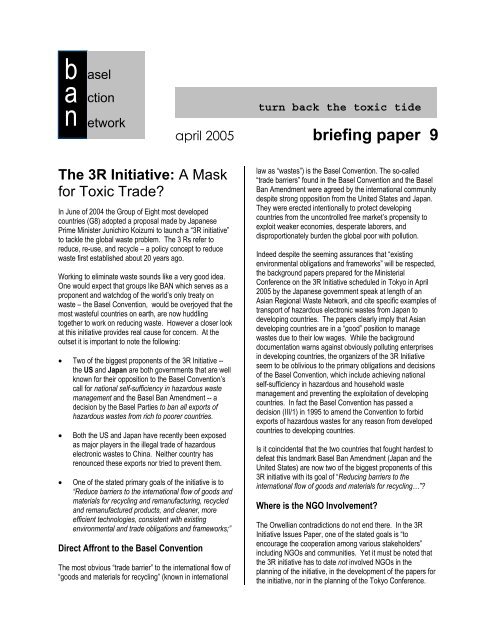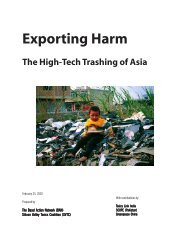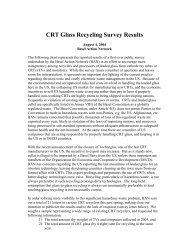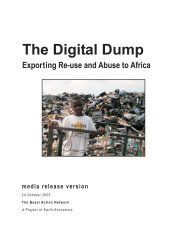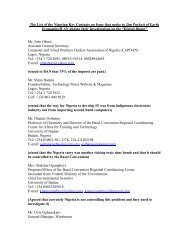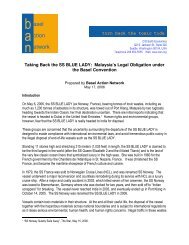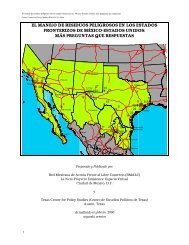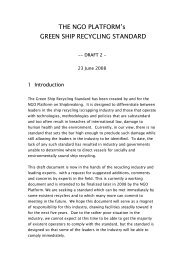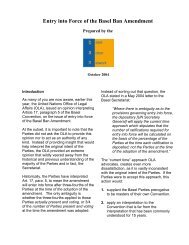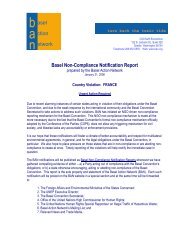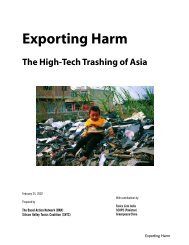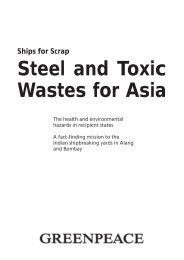briefing paper 9 The 3R Initiative - Basel Action Network
briefing paper 9 The 3R Initiative - Basel Action Network
briefing paper 9 The 3R Initiative - Basel Action Network
You also want an ePaper? Increase the reach of your titles
YUMPU automatically turns print PDFs into web optimized ePapers that Google loves.
a<br />
n<br />
asel<br />
ction<br />
etwork<br />
<strong>The</strong> <strong>3R</strong> <strong>Initiative</strong>: A Mask<br />
for Toxic Trade?<br />
In June of 2004 the Group of Eight most developed<br />
countries (G8) adopted a proposal made by Japanese<br />
Prime Minister Junichiro Koizumi to launch a “<strong>3R</strong> initiative”<br />
to tackle the global waste problem. <strong>The</strong> 3 Rs refer to<br />
reduce, re-use, and recycle – a policy concept to reduce<br />
waste first established about 20 years ago.<br />
Working to eliminate waste sounds like a very good idea.<br />
One would expect that groups like BAN which serves as a<br />
proponent and watchdog of the world’s only treaty on<br />
waste – the <strong>Basel</strong> Convention, would be overjoyed that the<br />
most wasteful countries on earth, are now huddling<br />
together to work on reducing waste. However a closer look<br />
at this initiative provides real cause for concern. At the<br />
outset it is important to note the following:<br />
• Two of the biggest proponents of the <strong>3R</strong> <strong>Initiative</strong> --<br />
the US and Japan are both governments that are well<br />
known for their opposition to the <strong>Basel</strong> Convention’s<br />
call for national self-sufficiency in hazardous waste<br />
management and the <strong>Basel</strong> Ban Amendment -- a<br />
decision by the <strong>Basel</strong> Parties to ban all exports of<br />
hazardous wastes from rich to poorer countries.<br />
• Both the US and Japan have recently been exposed<br />
as major players in the illegal trade of hazardous<br />
electronic wastes to China. Neither country has<br />
renounced these exports nor tried to prevent them.<br />
• One of the stated primary goals of the initiative is to<br />
“Reduce barriers to the international flow of goods and<br />
materials for recycling and remanufacturing, recycled<br />
and remanufactured products, and cleaner, more<br />
efficient technologies, consistent with existing<br />
environmental and trade obligations and frameworks;”<br />
Direct Affront to the <strong>Basel</strong> Convention<br />
<strong>The</strong> most obvious “trade barrier” to the international flow of<br />
“goods and materials for recycling” (known in international<br />
turn back the toxic tide<br />
april 2005 <strong>briefing</strong> <strong>paper</strong> 9<br />
law as “wastes”) is the <strong>Basel</strong> Convention. <strong>The</strong> so-called<br />
“trade barriers” found in the <strong>Basel</strong> Convention and the <strong>Basel</strong><br />
Ban Amendment were agreed by the international community<br />
despite strong opposition from the United States and Japan.<br />
<strong>The</strong>y were erected intentionally to protect developing<br />
countries from the uncontrolled free market’s propensity to<br />
exploit weaker economies, desperate laborers, and<br />
disproportionately burden the global poor with pollution.<br />
Indeed despite the seeming assurances that “existing<br />
environmental obligations and frameworks” will be respected,<br />
the background <strong>paper</strong>s prepared for the Ministerial<br />
Conference on the <strong>3R</strong> <strong>Initiative</strong> scheduled in Tokyo in April<br />
2005 by the Japanese government speak at length of an<br />
Asian Regional Waste <strong>Network</strong>, and cite specific examples of<br />
transport of hazardous electronic wastes from Japan to<br />
developing countries. <strong>The</strong> <strong>paper</strong>s clearly imply that Asian<br />
developing countries are in a “good” position to manage<br />
wastes due to their low wages. While the background<br />
documentation warns against obviously polluting enterprises<br />
in developing countries, the organizers of the <strong>3R</strong> <strong>Initiative</strong><br />
seem to be oblivious to the primary obligations and decisions<br />
of the <strong>Basel</strong> Convention, which include achieving national<br />
self-sufficiency in hazardous and household waste<br />
management and preventing the exploitation of developing<br />
countries. In fact the <strong>Basel</strong> Convention has passed a<br />
decision (III/1) in 1995 to amend the Convention to forbid<br />
exports of hazardous wastes for any reason from developed<br />
countries to developing countries.<br />
Is it coincidental that the two countries that fought hardest to<br />
defeat this landmark <strong>Basel</strong> Ban Amendment (Japan and the<br />
United States) are now two of the biggest proponents of this<br />
<strong>3R</strong> initiative with its goal of “Reducing barriers to the<br />
international flow of goods and materials for recycling…”?<br />
Where is the NGO Involvement?<br />
<strong>The</strong> Orwellian contradictions do not end there. In the <strong>3R</strong><br />
<strong>Initiative</strong> Issues Paper, one of the stated goals is “to<br />
encourage the cooperation among various stakeholders”<br />
including NGOs and communities. Yet it must be noted that<br />
the <strong>3R</strong> initiative has to date not involved NGOs in the<br />
planning of the initiative, in the development of the <strong>paper</strong>s for<br />
the initiative, nor in the planning of the Tokyo Conference.
Despite the claim of encouraging cooperation, NGOs have<br />
so-far been relegated as “observers” in the strictest sense.<br />
Two of the primary international networks working on waste<br />
issues – the <strong>Basel</strong> <strong>Action</strong> <strong>Network</strong> (BAN), and the Global<br />
Alliance for Incinerator Alternatives (GAIA), had to invite<br />
themselves to the Tokyo Conference.<br />
<strong>3R</strong>s is Obsolete<br />
<strong>The</strong> concept of <strong>3R</strong>s has been in use already for many<br />
years and in that time it has proven to be a useful concept.<br />
However, it has also been revealed to be inadequate alone<br />
to address some of the most important issues surrounding<br />
globalization, consumption, and wastes.<br />
One of the primary shortcomings with the <strong>3R</strong>s approach is<br />
that despite waste management hierarchies that have<br />
sought to establish priorities to give more weight to waste<br />
reduction and re-use, it is the last of the 3 Rs – recycling<br />
that ends up being the primary thrust. Recycling, while<br />
having great utility for non-hazardous waste, is far from<br />
being the best solution in comparison with the first 2 Rs.<br />
Recycling cannot address issues of over-consumption and<br />
profligate wastefulness.<br />
Further, where hazardous waste is concerned, such as in<br />
the matter of electronic waste, recycling by itself will tend to<br />
ensure that the hazards are not eliminated but rather<br />
passed on. <strong>The</strong> hazards will simply be shifted to impacting<br />
the recyclers and recipient communities as they exit the<br />
recycling process as pollution residues, or will be<br />
reintroduced as hazardous product into the marketplace.<br />
It must be understood that industry in general tends to gain<br />
by promoting recycling as a concept because they can<br />
appear to look “green” while continuing to promote<br />
business-as-usual and needless consumption in order to<br />
sell more product. If they can have recycling take place in<br />
the lowest wage countries of the world they profit even<br />
more. Industry, on the other hand will not be as likely to<br />
promote re-use and waste reduction efforts. For postconsumer<br />
wastes, reduction and re-use actually work<br />
directly against the economic bottomline as profits are<br />
maximized through rapid obsolescence and new sales.<br />
For this reason, recycling is too often the primary thrust of<br />
waste reduction programs like <strong>3R</strong>s, while reduction and reuse<br />
becomes the subject of talk without real action. We<br />
see no reason as yet to believe that this latest <strong>3R</strong>s push<br />
will be different than the past efforts in this regard.<br />
Perhaps the most obvious gauge of the bias away from the<br />
first 2 Rs only to embrace the 3rd, is the fact that all recent<br />
statistics from the Organization for Economic Cooperation<br />
and Development (OECD), show that, despite <strong>3R</strong> policies,<br />
not one G8 country has so far succeeded in even capping<br />
its waste generation, let alone reducing it. Rather, waste<br />
generation in each country has continued to rise in recent<br />
years. No real progress will be made on actual waste<br />
reductions until the emphasis in terms of implementation is<br />
placed on the first 2 Rs and not the last.<br />
A Fourth R is Needed -- Responsibility<br />
It has become clear that the <strong>3R</strong>s alone are not adequate<br />
as a basis for government or corporate policy. <strong>The</strong>y are<br />
strictly technological notions devoid of meaning without<br />
the essential 4th R – Responsibility.<br />
<strong>The</strong> fourth R of responsibility includes the concepts of<br />
producer responsibility (for the entire life cycle of a<br />
product, including efforts to enhance product longevity, toxics<br />
use reductions, energy efficiency, and design for recycling);<br />
individual consumer responsibility, (to make informed and<br />
responsible choices in consumption and disposal practices);<br />
national and international governmental responsibility<br />
(to embark on national waste reduction strategies, and to<br />
become self-sufficient in waste management); and<br />
social/democratic responsibility (the fabric that holds the<br />
other three tiers of responsibility dictates that we respect<br />
human rights and democratic involvement in all phases of<br />
decision making including the right to corporate planning and<br />
product design.<br />
Conclusion<br />
Unfortunately, the present form of the <strong>3R</strong> <strong>Initiative</strong> is a<br />
means to perpetuate business-as-usual behind a mask<br />
of a familiar and benign <strong>3R</strong> reputation. It has been<br />
designed to “run around” the <strong>Basel</strong> Convention, rather<br />
than embrace its obligations of waste prevention and<br />
national self-sufficiency in waste management.<br />
Meanwhile the global generation of hazardous waste<br />
continues to rise, as does the exploitation of<br />
international trade to irresponsibly sweep hazardous and<br />
other wastes out the backdoors of rich developed<br />
countries. If we are to assure that the <strong>3R</strong>s are not used<br />
as a password for such irresponsibility, we need to add<br />
the 4 th R to any waste policy. Only through the<br />
incorporation of Responsibility as the 4 th R, can we truly<br />
begin to embrace global environmental justice in waste<br />
management and focus on upstream solutions rather<br />
than exporting our problems downstream. <strong>The</strong> fate of<br />
future generations rests on the present generation’s<br />
willingness to take such responsibility seriously.<br />
<strong>The</strong> <strong>Basel</strong> <strong>Action</strong> <strong>Network</strong><br />
c/o Asia Pacific Environmental Exchange<br />
122 S. Jackson., Suite 320<br />
Seattle, WA. 98104<br />
Phone: 1.206.652.5555, Fax: 1.206.652.5750<br />
E-mail: info@ban.org, Website: www.ban.org<br />
printed on 100% post-consumer recycled <strong>paper</strong>


